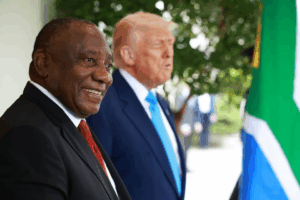By Imraan Buccus
From the peak of the Covid 19 crisis in 2020 to the July riots a year later and the floods last week; KwaZulu-Natal has been hit hard. With over 400 people dead and thousands of homes destroyed; words cannot capture the extent of the devastation.
And, as always, the poor have suffered the most.
People in KZN are still haunted by memories of the riots last year and it’s clear that the incapacity of the state is engraved in local memories. In the academy, we often talk about how local government is the central pivot in our society building exercise, but it is also the sphere of government most wracked by inefficiency and poor capacity. The chief cause of this dysfunction is the atrocious quality of the political leadership. This is not merely a matter of competence. As we all know; looting of the public purse at local government level is endemic.
To this day, dinner table conversations in Durban, among the rich and poor alike, often turn to how people in KZN were abandoned by the state during the riots. The police were completely absent or simply ill-equipped to deal with the situation as the crisis escalated. People were left on their own for days. This resulted in both new forms of solidarity and self-organisation and in horrific murders.
This time, during the floods and in its immediate aftermath, the state has also been slow in its response. Many poor communities have taken to the streets in protest. Many questions have been asked of Durban’s rambling mayor and what preventative steps were taken by the political leadership following the floods in 2019. As I write many communities still have no water. Some councillors are doing their best to keep communities updated but the city simply does not communicate in any cohesive way.
State failure leads people to look elsewhere for support. In this crisis, as happened during the lockdowns and the riots, many people have turned to NGOs, religious institutions, community organisations, organisations of the poor and the existing social capital in their neighbourhoods.
In Chatsworth, community leaders were quick to put up the addresses of more than 10 mosques where borehole water was available at no cost. This became the norm across multiple communities in KZN. NGOs like WeFeedSA, working collaboratively with other NGOs, have managed to provide 3 meals a day to over 40 000 flood victims in recent days. This is an extraordinary achievement that far outstrips any sort of response from the state. There are multiple other examples where NGOs are doing what one would ordinarily expect from the local state.
In terms of self-organisation, some organisations of the poor have been able to respond quickly and effectively in times of crisis.
But as remarkable as all this work is, we do have to ask why it is that religious and charitable organisations and the city’s uniquely powerful social movement are the first to respond in times of crises, and sometimes respond in a far more sustained ways than the state. After all, the state’s resources are much, much greater than any other kind of organisation.
If we have a functional state it would have taken preventative measures to reduce the risks of flooding, maintained infrastructure properly and sprung into quick and effective action when flood waters overwhelmed even the best paid plans. But we have a largely failed state, a state that is more of kleptocracy than a social project. The election of Zandile Gumede as ANC chairperson in the eThekwini region has shown that the bulk of the local ANC is utterly unrepentant about its failures.
It’s hardly surprising that more and more people are saying that they’d rather pay their tax to religious, charitable and community-based organisations than to the state.
Dr Buccus is Al Qalam editor and academic director of a university study abroad program on political transformation.


